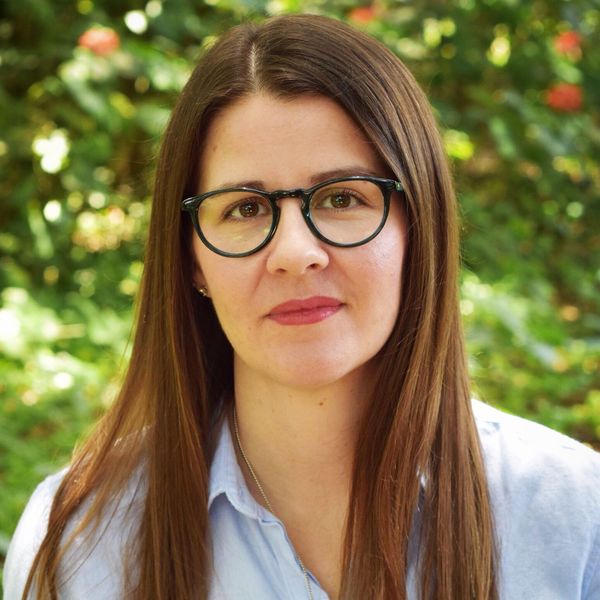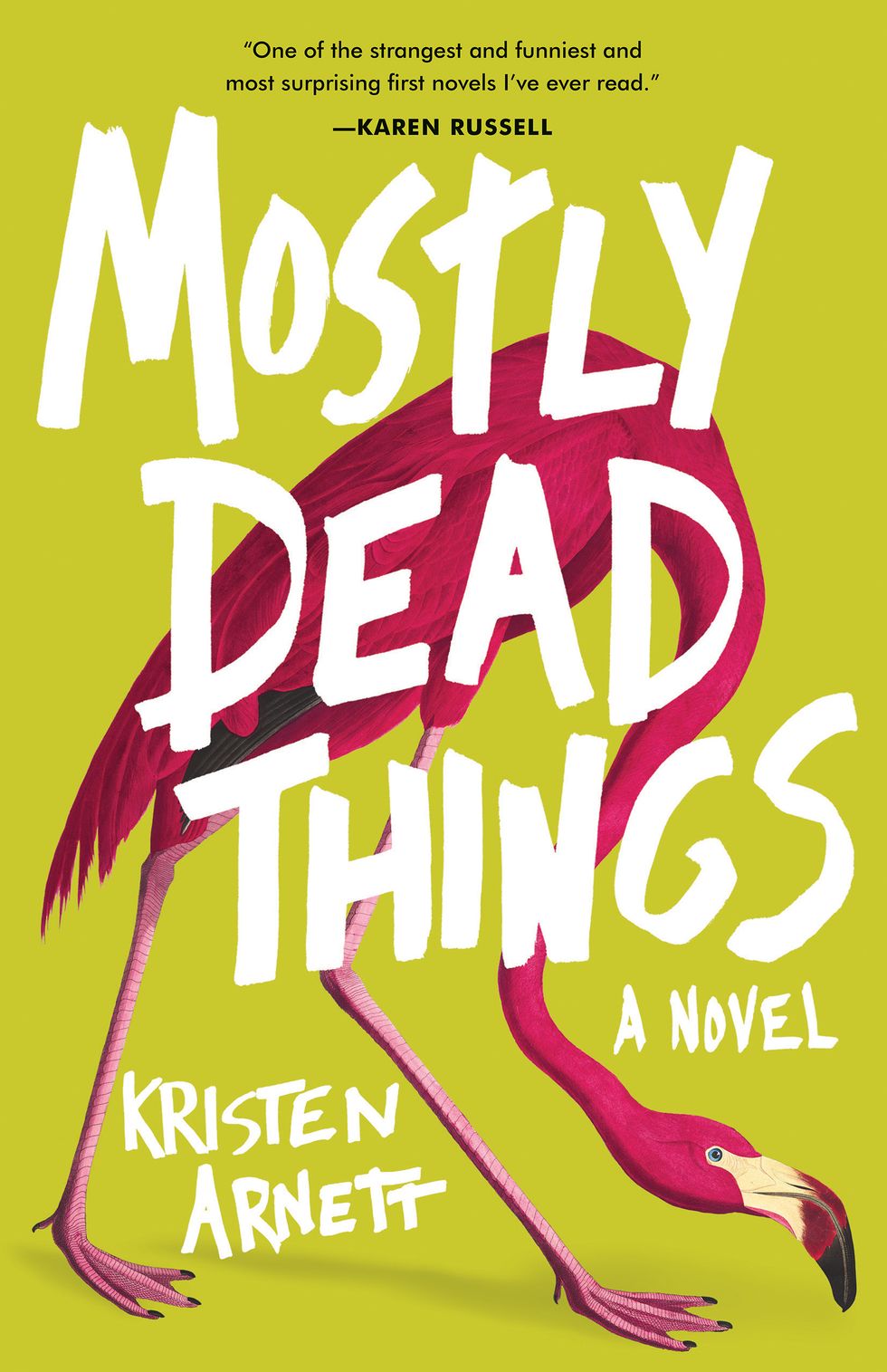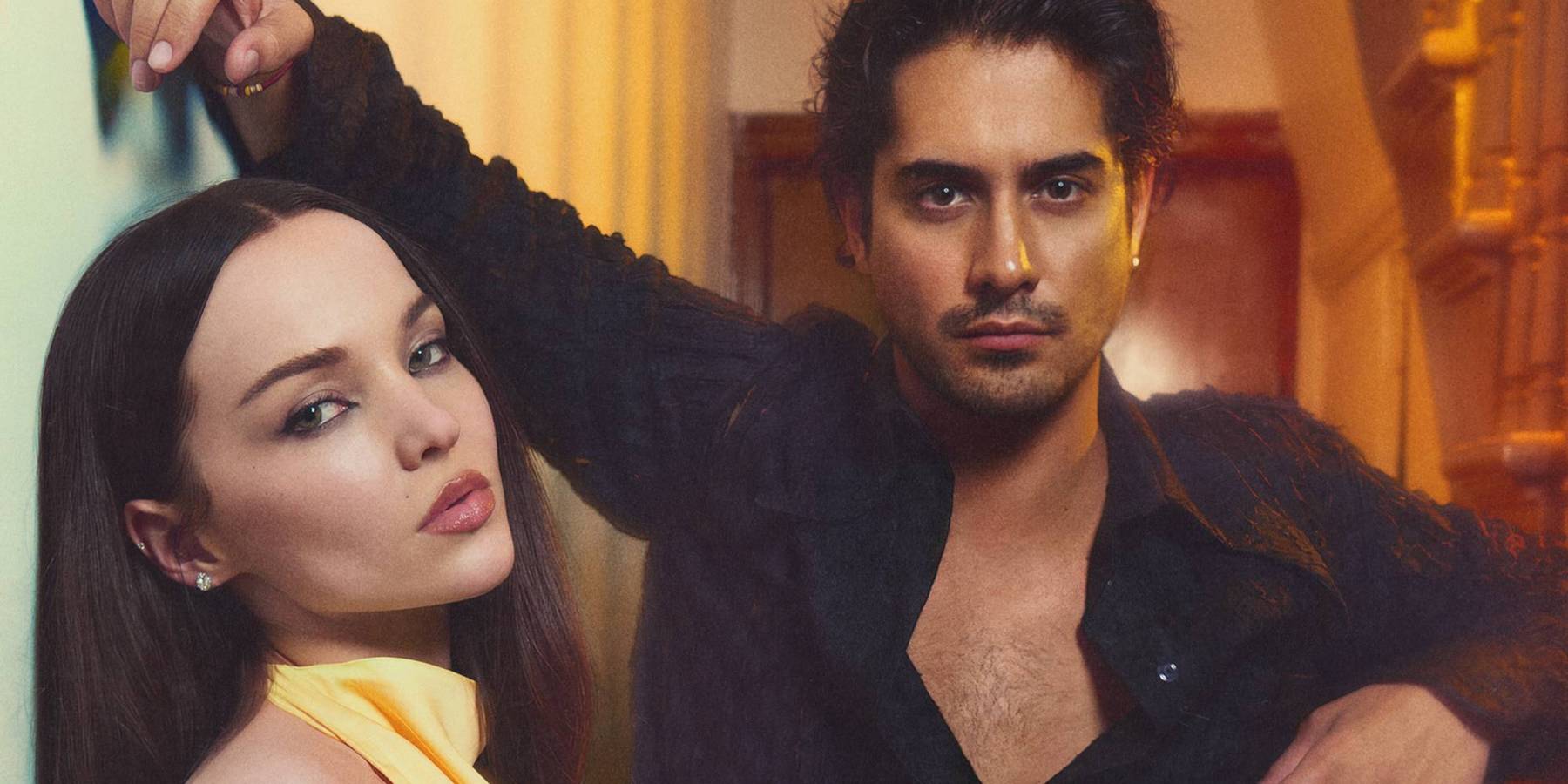
Kristen Arnett on Florida, Queerness, and 7-Eleven
by Greg Mania
Jun 17, 2019
Every once and awhile, there's a voice that shoots out of the Twittersphere and into the shows, movies, and books we love. Kristen Arnett is no exception. With a voice primed to take on whichever medium she puts her mind to, the Florida-born writer has captivated readers and critics alike with her New York Times-bestselling debut, Mostly Dead Things, out now from Tin House.
In this charmingly strange and heart-wrenching debut set in Florida, Jessa-Lynn Morton inherits her family's taxidermy shop after her father commits suicide. She's tasked with keeping her father's business afloat while also navigating grief and its myriad effects on the rest of her family. Her brother, Milo, has become withdrawn. Her mother has taken to creating lewd art with the taxidermied animals from the shop. Jessa is also haunted by the absence of Brynn, Milo's wife and the only person she's ever been in love with. In order to keep her family and business from crumbling, Jessa's forced to contend with the past in order to reconcile herself with her family, and her place in it.
PAPER caught up with the bestselling author to talk about her starkly funny debut, below.
There are a number of titles, both fiction and non, from authors like Lauren Groff to Alissa Nutting to Kelly Link to recent fellow debut superstar T Kira Madden, that utilize Florida as a prominent backdrop. Why is Florida such an endless buffet of inspiration?
When I think about Florida, I'm reminded of how ALIVE it is. I mean, it's just constantly creeping, pressing in on you all the time. The plant life, it's invasive. It gets ahold of you and makes it difficult to forget. I'm here, it's saying all the time, like a little tap on the shoulder. There are always things here touching you, reminding you of where you are. I love that. Florida is a place that's endlessly fascinating to me because it's a place that's constantly growing. I think that if I ever got bored with Florida, I'd stop writing about it. But that's the thing about Florida. We might be a lot of things, but we're never gonna be boring.
In your interview with Longreads, you say that you're a person who titles first. I was stoked to read that because I am, too! I will structure a piece around one joke, a whole essay collection around a title. How does this approach strengthen your writing?
I would say that it just feels like a natural progression for me. It's almost a habit at this point. I am not a person who outlines anything. I always wanna be surprised by what the characters might do or think or say. Even in essay work I feel this way. I want to surprise myself by finding the question underneath the question, the one I'm actually trying to ask. I'd say that titling first is the one way that I am trying to "outline," if that makes sense. It's my single foray into trying to know anything about the work before I put the pen to paper (or fingers to keys, let's be real here). With that title at the top of the page, I feel ready to get down into the work of discovering what I'm actually trying to write.
Related | Ten Lit Recs From Pop Singer Alexina
Your protagonist, Jessa, is a queer taxidermist who inherits her father's business after his death. How much did you know about taxidermy before you wrote this book?
I have always been around taxidermy — I mean, I'm in Florida! We have a ton of it here. It was always in people's houses and in buildings, even in restaurants. I would see it everywhere, but I'd never really thought about what it meant to process an animal that way. I just saw the end product and never really thought about what it means to gut and create the work. So when I started doing some research about it, I was fascinated. There is just so much to learn and know; so many different ways to carve out an animal. Tools, acid baths, everything — there are a million different ways to taxidermy a thing. I just sort of fell down the rabbit hole with it. I read books, watched videos, and went into chat rooms. I wanted to know as much as I possibly could, and it still feels like there is so much more I could learn about it. It's a very detailed and painstaking thing, to recreate an animal and make it look alive. It's really hard work, and it's also very much an artform for people. I love that.
Jessa's queerness is, refreshingly, not part of the impetus of the plot. Why was it important, to you, to write her and her queerness this way?
I think about what I want to read in a book myself. I am not interested in coming-out narratives. There are tons of places for that, and I have read many of those stories, but that is not the part about queerness that interests me. I am more interested — I would even say fully fascinated — in the day-to-day functions of how queerness works. In a household. How does queerness function in a job, interacting with friends, going to dinner, or getting drinks with a date? It is something that's just embedded in our lives, and I wanted it to be fully embedded in the text this way. I don't wanna see it propped up as a thing that needs to necessarily be examined under a microscope. I think it should just be there in the lived experience. It's important for me as a reader to see this, and it's important for me as a writer to include it in my own work.

Jessa's also very meticulous and attentive to detail, almost observing her work on a molecular level. Are you like that in any facet(s) of your life? Are there any other traits you share with her?
I am very chill about almost everything. I am a very relaxed, very impulsive, and go-with-the-flow kind of person who likes to make jokes. The one way in which I am not like that is probably in how I think about work. I take my work very, very seriously — both in terms of writing as well as librarianship.
Librarianship requires this kind of flexibility, for sure, but it also means needing to find the exact information. It's guesswork, but it's also research and it's digging into a problem and examining it from all sides. Writing is like that for me, too. I want to look at work and really spend time inside it. I am not an outliner, but I do want to immerse myself in a project until I feel fully engaged in the world I am creating. I want to know what the characters know when they know it. So I would say I am detail-oriented in that way. But then there's also the me that forgets to eat dinner because I just wasn't thinking about it.
You manage to capture the humor in the ordinary with wit and brevity, and the payoff sends ripples off the page. It's brilliant. It reminds me of many of your Tweets. Has tweeting jokes — being limited by a character limit — influence how you structure your longform writing?
I think that I use Tweets as a way to test material, almost like it's improv or standup. I want to see how many ways I could try out a joke or a format before it gets boring or old for me. Or how many ways I can tell the same joke. So in that way I think it is like writing, in a sense, because I am trying to dig into the heart of a thing and see what makes it tick. I also think being silly and absurd is always just very funny to me, so I am going into anything seeing if I can make myself laugh. That's all I am really trying to do. If I can make myself laugh, then I've succeeded.
Did writing in this tone make writing about things like loss and grief a bit more tolerant?
I think that humor just stands next to those things all the time. Things can be beautiful and they can also be ugly. The neat and messy. The pain and the pleasure. Humor fits in there, too. There is this way that we need it as a coping mechanism, sure, but I also think that humor just oftentimes rides alongside things like grief because they just go hand in hand. You can't really experience one without the other because we're all people and contain so many different kinds of feelings about everything, all at once, and those feelings are constantly changing and morphing into something different. Also, I do think things are oftentimes unintentionally funny. People are just so strange. That means that even when they are in grief or in the midst of loss, they are still going to be weird. To act in very wild ways. And that is inevitably funny!
You write: "we spent so much time looking for pieces of ourselves in other people that we never realize they were busy searching for the same thing in us." First of all, why are you SO GOOD. Second, do you think Jessa can reconcile herself with...herself? Even if the two people who mattered most to her, the ones who she felt knew her best — her father and Brynn — are absent from her life?
I think we are constantly trying to discover who we are. We are looking inside to try and figure out a way to categorize ourselves almost daily because it is so hard being a person and wondering how we feel all the time. So I don't know if Jessa will ever be able to reconcile herself because oh wow, can any of us? Every time I think I have myself figured out, I go and change again. And that's the way it should be, right? We are all just constantly changing and that's why life is never boring and that's why we can never really know anything about ourselves. I love it and I hate it. Don't we all!
Pivoting to your relationship with 7-Eleven, which you're basically the brand ambassador of judging by your Tweets. Do you have a go-to order? Is your cashier your emergency contact?
I am always buying Steel Reserve and Yosemite Road two-for-eight dollar red wine. So that's always in stock! I just like to pop in on my cashier and they give me hell all the time and bust my chops, which I absolutely adore. I'll tell them when I'm going out of town so they won't think I've died!
There is just so much happening around this release. You're everywhere! Besides publishing a book, what has the most unreal part of all of this been for you?
I think all of it has just felt like a very prolonged, very surreal dream. It's been the loveliest just talking with people who have felt close to the work. That makes me happy. That's always the best part, I think, when I talk to someone and they say that they felt like the book touched them. That will forever be so meaningful to me. I feel profoundly lucky.
Mostly Dead Things is available for purchase here.
Photography: Maria Jones
MORE ON PAPER
Entertainment
Dove Cameron and Avan Jogia Broke Their Molds
Photography by Gustavo Chams / Story by Joan Summers
Photography by Gustavo Chams / Story by Joan Summers
18 February
ATF Story
Madison Beer, Her Way
Photography by Davis Bates / Story by Alaska Riley
Photography by Davis Bates / Story by Alaska Riley
16 January
Entertainment
Cynthia Erivo in Full Bloom
Photography by David LaChapelle / Story by Joan Summers / Styling by Jason Bolden / Makeup by Joanna Simkim / Nails by Shea Osei
Photography by David LaChapelle / Story by Joan Summers / Styling by Jason Bolden / Makeup by Joanna Simkim / Nails by Shea Osei
01 December
Entertainment
Rami Malek Is Certifiably Unserious
Story by Joan Summers / Photography by Adam Powell
Story by Joan Summers / Photography by Adam Powell
14 November
Music
Janelle Monáe, HalloQueen
Story by Ivan Guzman / Photography by Pol Kurucz/ Styling by Alexandra Mandelkorn/ Hair by Nikki Nelms/ Makeup by Sasha Glasser/ Nails by Juan Alvear/ Set design by Krystall Schott
Story by Ivan Guzman / Photography by Pol Kurucz/ Styling by Alexandra Mandelkorn/ Hair by Nikki Nelms/ Makeup by Sasha Glasser/ Nails by Juan Alvear/ Set design by Krystall Schott
27 October




